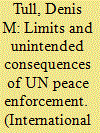| Srl | Item |
| 1 |
ID:
158104


|
|
|
|
|
| Summary/Abstract |
Recent scholarship has discerned an increasing tendency of the UN Security Council to push the boundaries of UN peacekeeping beyond traditional doctrine by equipping peace operations with ever more robust and even peace enforcement mandates. The first and most frequently cited example of this turn is the so-called Force Intervention Brigade (FIB) in the DR Congo. Yet, a comprehensive account of the FIB experience is still missing. Authorized in March 2013 to launch offensive military operations against insurgent groups, the FIB may come to epitomize a sea change in the transition from robust peacekeeping to a qualitatively different kind of UN peace operation. Thus, studying the FIB can offer important insights about the advantages and challenges that may be in store for the UN, should the organization indeed turn towards peace enforcement. The articles analyses the origins, performance and consequences of the FIB in terms of conflict resolution and state-building. It also examines its organizational impact on the UN peace operation in which it was embedded (Monusco). It finds that the FIB has not proven to be the game changer. Instead, it had unintended negative consequences both on state-building and the performance of UN peacekeepers.
|
|
|
|
|
|
|
|
|
|
|
|
|
|
|
|
| 2 |
ID:
147774


|
|
|
|
|
| Summary/Abstract |
IN 2015, the world marked the 70th anniversaries of two key events of the 20th century. One of them was the end of the Great Patriotic War and World War II. The other was the establishment of the United Nations, an organization entrusted with the mission of consolidating peace that had cost so much to achieve. The United Nations' number one objective as stated in its Charter, which came into force on October 24, 1945, is "to maintain international peace and security, and to that end: to take effective collective measures for the prevention and removal of threats to the peace..."1 Seven decades later, the organization's ability to follow this commandment by adapting to new threats and challenges is increasingly called into question.
|
|
|
|
|
|
|
|
|
|
|
|
|
|
|
|